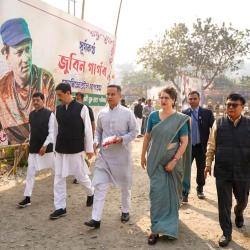With the threat of Dima Halem Deogah (DHD) serving ultimatum upon the Government of India to concede to their demands before October 2, 2010 and delay in holding peace talks, situation in the region seems to be going on the wrong track. All Dimasa Students Union(ADSU),Dimasa Peoples Council (DPC) and UPFA in a joint press conference in Guwahati have said that the media report goes on that the Dima Halem Daogah (DHD) has given ultimatum to concede their demand of Dimaraji to the Government of India, which came into cease-fire agreement with the government in 2003, responding and respecting the public opinion to abjure violence and come to talk with the government so that they could solve the demands raised by them through peaceful means. M K Phonglo, working president, DPC, S Kemprai, General Secretary, DPC, R Hasnu, General Secretary, ADSU and J R Muchahary, President, UPFA addressed the press conference. They said that DHD began tripartite talks with the Centre and state governments. Their main demand was the creation of Dimaraji for the safeguard and speedy development of the people living in the proposed Dimaraji, who has also raised socio-economic grievances of the Dimasa people of Assam in their charter of demands.
Other democratic organizations like ADSU, DRDC, DMS, DKH etc; who were the frontal bodies who launched movement for the creation of Dimaraji, a long democratic movement from 1991, even they welcomed the initiatives taken by the government and suspended temporarily their movement for the peaceful environment for talks. They were disappointed over the ultimatum served by DHD, as no acceptable and fruitful solution of the issue came up even after seven years. The DHD feels that the government has no clear-cut policy on solution of the Dimasa problems and other indigenous and tribal problems in India.
They further said that the facilitators and civil society bodies think this ultimatum and threat to pull out from peace process to go back to jungle, would jeopardize the whole peace process undertaken by the government not only for the DHD, but also would adversely impact and complicate the cease fire processes with other militant groups of the North-east India. They would lose faith in peace talks and may resort to the path of violence and subversive activities, which might polarize in due course of time. The peace loving democratic organizations strongly feel that the governments are not up to their expectation of executing their commitments. and are just passing time without involving in the process seriously. They feel that the government instead of solving the problems is rather complicating the peace processes by delaying tactics and confusing more, which has resulted to this kind of threat from the militant groups on ceasefire agreement.
They further said that the government appointed P C Haldar as interlocutor to talk with DHD and other ceasefire militants groups of Assam and the Assam government even constituted Cabinet subcommittee under the Chairmanship of Dr Bhumidhar Barman, to solve Dimaraji issue and other problems of Assam. Several times the discussions held for amicable and acceptable solution of the Dimaraji issue and other related problems and recommendations and suggestions were put forward, but no fruitful result came out. They said that ‘the ball is now in government’s court’, whether the government would like to take the responsibility of pulling out of the peace process forcing DHD back to jungle or concede its demand for peace and prosperity of the proposed people of Dimaraji. They also appealed to DHD leadership to re-consider their stand in the best interest of the people living in the proposed Dimaraji.
- 8450 reads










Add new comment